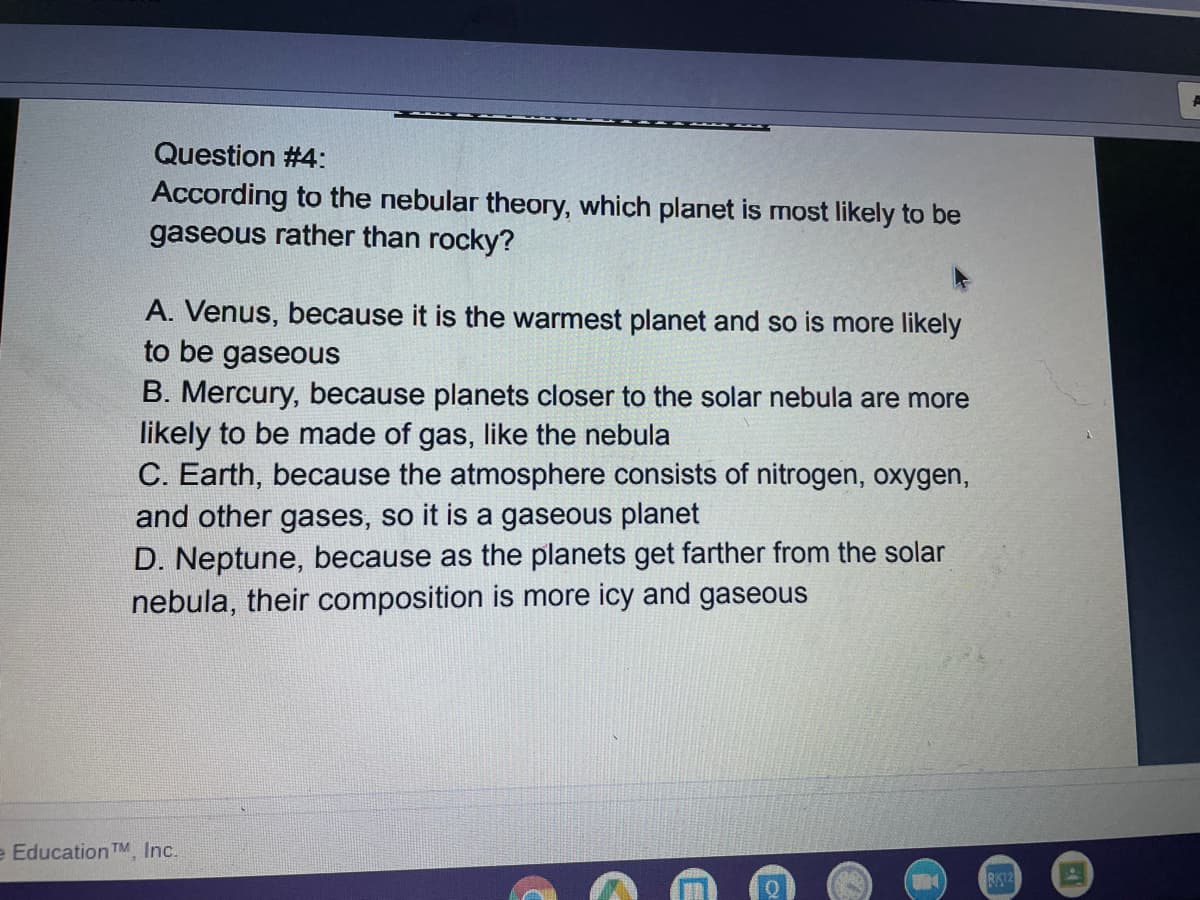According to the nebular theory, which planet is most likely to be gaseous rather than rocky? A. Venus, because it is the warmest planet and so is more likely to be gaseous B. Mercury, because planets closer to the solar nebula are more likely to be made of gas, like the nebula C. Earth, because the atmosphere consists of nitrogen, oxvgen.
According to the nebular theory, which planet is most likely to be gaseous rather than rocky? A. Venus, because it is the warmest planet and so is more likely to be gaseous B. Mercury, because planets closer to the solar nebula are more likely to be made of gas, like the nebula C. Earth, because the atmosphere consists of nitrogen, oxvgen.
Astronomy
1st Edition
ISBN:9781938168284
Author:Andrew Fraknoi; David Morrison; Sidney C. Wolff
Publisher:Andrew Fraknoi; David Morrison; Sidney C. Wolff
Chapter7: Other Worlds: An Introduction To The Solar System
Section: Chapter Questions
Problem 22E: Earlier in this chapter, we modeled the solar system with Earth at a distance of about one city...
Related questions
Question

Transcribed Image Text:Question #4:
According to the nebular theory, which planet is most likely to be
gaseous rather than rocky?
A. Venus, because it is the warmest planet and so is more likely
to be gaseous
B. Mercury, because planets closer to the solar nebula are more
likely to be made of gas, like the nebula
C. Earth, because the atmosphere consists of nitrogen, oxygen,
and other gases, so it is a gaseous planet
D. Neptune, because as the planets get farther from the solar
nebula, their composition is more icy and gaseous
e Education TM Inc.
RK12
Expert Solution
This question has been solved!
Explore an expertly crafted, step-by-step solution for a thorough understanding of key concepts.
This is a popular solution!
Trending now
This is a popular solution!
Step by step
Solved in 2 steps

Knowledge Booster
Learn more about
Need a deep-dive on the concept behind this application? Look no further. Learn more about this topic, physics and related others by exploring similar questions and additional content below.Recommended textbooks for you

Astronomy
Physics
ISBN:
9781938168284
Author:
Andrew Fraknoi; David Morrison; Sidney C. Wolff
Publisher:
OpenStax


Foundations of Astronomy (MindTap Course List)
Physics
ISBN:
9781337399920
Author:
Michael A. Seeds, Dana Backman
Publisher:
Cengage Learning

Astronomy
Physics
ISBN:
9781938168284
Author:
Andrew Fraknoi; David Morrison; Sidney C. Wolff
Publisher:
OpenStax


Foundations of Astronomy (MindTap Course List)
Physics
ISBN:
9781337399920
Author:
Michael A. Seeds, Dana Backman
Publisher:
Cengage Learning

Horizons: Exploring the Universe (MindTap Course …
Physics
ISBN:
9781305960961
Author:
Michael A. Seeds, Dana Backman
Publisher:
Cengage Learning


An Introduction to Physical Science
Physics
ISBN:
9781305079137
Author:
James Shipman, Jerry D. Wilson, Charles A. Higgins, Omar Torres
Publisher:
Cengage Learning